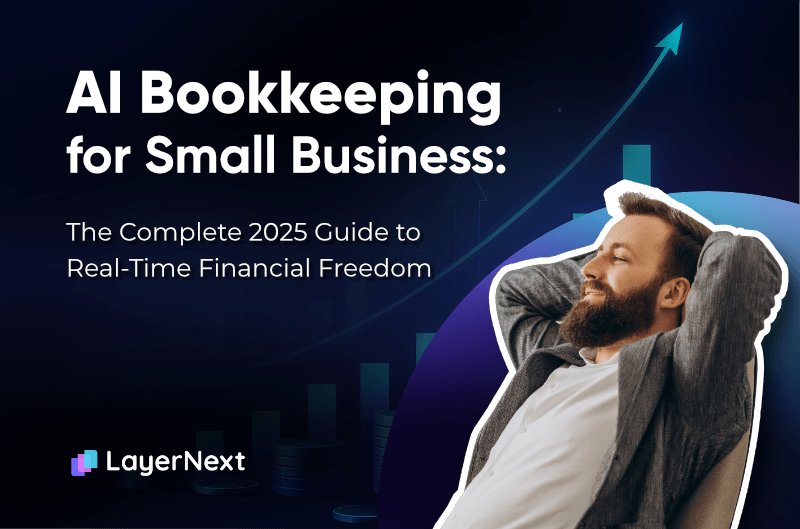
Get in Touch
Tell us about yourself and we will get back to you as soon as we can.

Tell us about yourself and we will get back to you as soon as we can.


Are you still waiting weeks to see your financial numbers? Wrestling with spreadsheets at midnight? Wondering if you can actually afford that next hire?
You're not alone. According to recent industry data, 64% of small business owners manage their own books, and nearly half of all startups fail within five years due to cash flow problems. The culprit? Outdated bookkeeping that leaves you flying blind.
The solution isn't hiring an expensive CFO or spending hours on QuickBooks. It's AI-powered bookkeeping that works while you sleep.
AI bookkeeping uses artificial intelligence and machine learning to automate the entire financial record-keeping process. Unlike traditional accounting software that requires manual data entry, AI bookkeeping systems automatically:
Think of it as having a CFO, bookkeeper, and financial analyst all working 24/7 without the $200,000+ salary.
Traditional bookkeeping software still requires you to:
AI bookkeeping eliminates 80-95% of these manual tasks. According to a 2025 Intuit survey, 46% of accountants now use AI daily, reporting that it boosts productivity by 81% and reduces mental load by 86%.
Manual bookkeeping isn't just time consuming, it's actively costing you money and opportunities.
Studies show that automation reduces time spent on manual bookkeeping by up to 40%. For a small business owner billing at $100/hour, spending 10 hours monthly on books means losing $1,000 in productive time, that's $12,000 annually.
When your financial data is weeks old, you can't:
A retail chain that implemented real-time reporting cut inventory costs by 20% within six months simply because they could make accurate purchasing decisions based on current data.
Manual data entry has an error rate of 1-5%. On 10,000 annual transactions, that's 100-500 mistakes potentially affecting your tax returns, investor reports, and business decisions.
With evolving tax regulations and the 2023 e-invoicing implementation, keeping up with compliance manually is increasingly risky. 51% of accounting firms cite keeping up with regulatory changes as their biggest challenge.
Modern AI bookkeeping platforms have evolved far beyond simple expense tracking. Here's what happens behind the scenes:
Connect your bank accounts, credit cards, and payment processors once. The AI pulls in every transaction automatically no more manual uploads or CSV imports.
Using machine learning trained on millions of transactions, the system categorizes each expense with context awareness:
The AI learns your business patterns and gets smarter over time, achieving 95%+ accuracy within weeks.
Unlike monthly reconciliation marathons, AI matches transactions to bank feeds continuously. When discrepancies appear, you're notified immediately, not discovered weeks later.
Want to see your P&L? It's ready. Need your cash flow statement for an investor call in 10 minutes? Done. Real-time financial reporting means your books are always closed, always current.
The AI doesn't just record history, it predicts the future:

The difference between successful and failed startups often comes down to financial visibility. Real-time insights provide:
Know exactly how much cash you have, what's coming in, and what's going out right now. Not last month, not last week. Now.
This matters because cash flow problems cause 82% of small business failures. With real-time visibility, you can:
For startups and growing businesses, knowing your runway is existential. AI bookkeeping calculates this automatically:
A tech startup using real-time dashboards restructured their budget based on immediate insights, leading to a 15% profit boost within a year.
Stop the year-end scramble. With automated categorization and real-time tracking, your books are tax-ready every single day. This means:
Real-time financial data transforms you from reactive to proactive:
Traditional Bookkeeper:
QuickBooks + Your Time:
AI Bookkeeping:
The ROI is clear: save 60-90% on costs while getting better, faster insights.

Not all AI bookkeeping platforms are created equal. Here's what to look for in 2025:
1. Automatic Bank Connectivity The system should connect directly to your financial institutions with no manual uploads.
2. Real-Time Reconciliation Daily or continuous reconciliation, not monthly batch processing.
3. AI-Powered Categorization Machine learning that adapts to your business, not just generic rules.
4. Instant Financial Dashboards Real-time access to P&L, balance sheet, cash flow, burn rate, and runway.
5. Tax Optimization Built-in tax insights and deduction recommendations.
6. Multi-Entity Support If you have multiple businesses or plan to grow, ensure the platform scales.
7. Mobile Access Manage your finances from anywhere, on any device.
8. Expert Support Access to human expertise when you need it, not just chatbots.
1. How quickly can I get started? Look for setup times measured in minutes, not weeks.
2. What's the learning curve? The best AI bookkeeping requires minimal accounting knowledge.
3. How does pricing scale? Understand costs as transaction volume grows.
4. What integrations are available? Ensure compatibility with your payment processors, payroll, etc.
5. Is there a money-back guarantee? Reputable platforms stand behind their product.
6. What happens to my data? Understand ownership, security, and export capabilities.
Making the switch to AI bookkeeping is easier than you think. Here's the proven process:
Ask yourself:
If you're spending more than 2 hours monthly or can't confidently answer these questions, you need AI bookkeeping.
Before connecting:
Don't worry about perfection. AI bookkeeping can handle messy data and even catch up on backlogged books.
Modern AI bookkeeping platforms make onboarding painless:
Don't worry about perfection. AI bookkeeping can handle messy data and even catch up on backlogged books.
For the first month, check in weekly:
After the initial learning period, many businesses only need 30 minutes monthly for oversight.
Now that bookkeeping is handled, focus on what matters:
The accounting profession has embraced a fundamental truth: technology should handle repetitive tasks so humans can focus on strategy and growth.
With 91% of business leaders reporting that AI saves them at least 30 minutes daily, and the global accounting software market projected to reach $12 billion by 2026, the shift to AI bookkeeping isn't a trend, it's the new standard.
The question isn't whether to adopt AI bookkeeping. It's whether you can afford not to while your competitors gain real-time visibility and strategic advantages.
Imagine:
This isn't a future vision. it's available today with AI-powered bookkeeping.
Ready to transform your financial management?
LayerNext is your AI CFO that automates bookkeeping, reconciles transactions in real-time, and delivers the financial insights founders need to grow with confidence. No more spreadsheets. No more manual entry. Just real-time clarity and financial freedom.
Join the first 100 founding users and lock in $99/month forever. Your books will never be behind again.
Yes. Modern AI bookkeeping achieves 98-99.5% accuracy rates, often exceeding human bookkeepers. The continuous reconciliation and automated categorization ensure tax-ready books year-round.
AI handles the repetitive bookkeeping tasks, but you'll still want a CPA for tax strategy, complex situations, and annual filing. However, your accountant's job becomes easier (and cheaper) with clean, accurate data.
Most AI bookkeeping platforms can be fully operational in under an hour. You'll connect your accounts, answer a few setup questions, and the AI starts working immediately.
Many AI platforms offer catch-up bookkeeping services. They can process historical transactions, clean up past errors, and get you current, usually within weeks.
Reputable AI bookkeeping platforms use bank-level encryption (256-bit), SOC 2 compliance, and secure data centers. Your data is often more secure than keeping it in desktop software or paper files.
Modern AI platforms adapt to industry-specific requirements, whether you're in e-commerce, professional services, real estate, or hospitality. The machine learning customizes to your business patterns.
You maintain oversight and can correct any miscategorizations. The AI learns from your corrections, getting smarter over time. Plus, continuous reconciliation catches discrepancies immediately.
Pricing typically ranges from $99-500/month depending on transaction volume and features. This is 60-90% less than traditional bookkeepers while providing superior real-time insights.
About LayerNext: We're building the future of small business finance. Our AI CFO platform eliminates bookkeeping chaos, giving founders real-time clarity to run their business with confidence. Learn more at layernext.ai.
Tags: AI bookkeeping, automated bookkeeping, small business accounting, real-time financial insights, AI CFO, bookkeeping software, startup bookkeeping, financial automation, cash flow management, burn rate tracking
